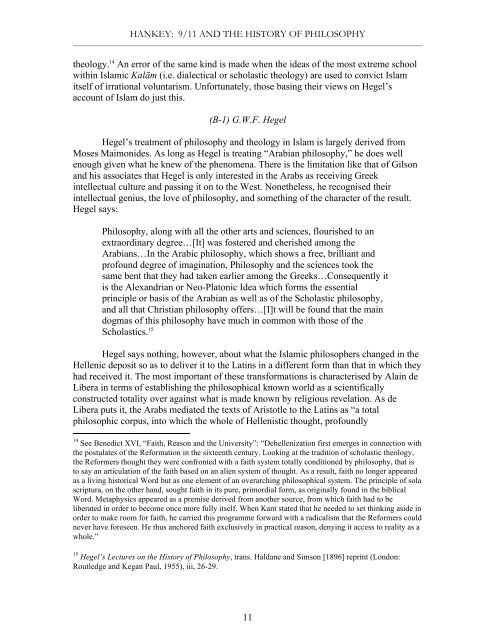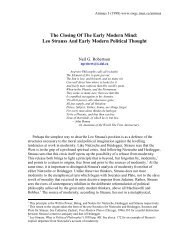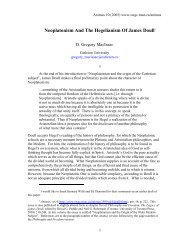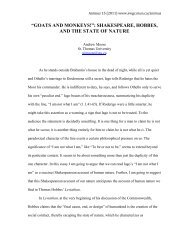Wayne Hankey, 9/11 and the History of Philosophy - Memorial ...
Wayne Hankey, 9/11 and the History of Philosophy - Memorial ...
Wayne Hankey, 9/11 and the History of Philosophy - Memorial ...
Create successful ePaper yourself
Turn your PDF publications into a flip-book with our unique Google optimized e-Paper software.
HANKEY: 9/<strong>11</strong> AND THE HISTORY OF PHILOSOPHY<strong>the</strong>ology. 14 An error <strong>of</strong> <strong>the</strong> same kind is made when <strong>the</strong> ideas <strong>of</strong> <strong>the</strong> most extreme schoolwithin Islamic Kalām (i.e. dialectical or scholastic <strong>the</strong>ology) are used to convict Islamitself <strong>of</strong> irrational voluntarism. Unfortunately, those basing <strong>the</strong>ir views on Hegel’saccount <strong>of</strong> Islam do just this.(B-1) G.W.F. HegelHegel’s treatment <strong>of</strong> philosophy <strong>and</strong> <strong>the</strong>ology in Islam is largely derived fromMoses Maimonides. As long as Hegel is treating “Arabian philosophy,” he does wellenough given what he knew <strong>of</strong> <strong>the</strong> phenomena. There is <strong>the</strong> limitation like that <strong>of</strong> Gilson<strong>and</strong> his associates that Hegel is only interested in <strong>the</strong> Arabs as receiving Greekintellectual culture <strong>and</strong> passing it on to <strong>the</strong> West. None<strong>the</strong>less, he recognised <strong>the</strong>irintellectual genius, <strong>the</strong> love <strong>of</strong> philosophy, <strong>and</strong> something <strong>of</strong> <strong>the</strong> character <strong>of</strong> <strong>the</strong> result.Hegel says:<strong>Philosophy</strong>, along with all <strong>the</strong> o<strong>the</strong>r arts <strong>and</strong> sciences, flourished to anextraordinary degree…[It] was fostered <strong>and</strong> cherished among <strong>the</strong>Arabians…In <strong>the</strong> Arabic philosophy, which shows a free, brilliant <strong>and</strong>pr<strong>of</strong>ound degree <strong>of</strong> imagination, <strong>Philosophy</strong> <strong>and</strong> <strong>the</strong> sciences took <strong>the</strong>same bent that <strong>the</strong>y had taken earlier among <strong>the</strong> Greeks…Consequently itis <strong>the</strong> Alex<strong>and</strong>rian or Neo-Platonic Idea which forms <strong>the</strong> essentialprinciple or basis <strong>of</strong> <strong>the</strong> Arabian as well as <strong>of</strong> <strong>the</strong> Scholastic philosophy,<strong>and</strong> all that Christian philosophy <strong>of</strong>fers…[I]t will be found that <strong>the</strong> maindogmas <strong>of</strong> this philosophy have much in common with those <strong>of</strong> <strong>the</strong>Scholastics. 15Hegel says nothing, however, about what <strong>the</strong> Islamic philosophers changed in <strong>the</strong>Hellenic deposit so as to deliver it to <strong>the</strong> Latins in a different form than that in which <strong>the</strong>yhad received it. The most important <strong>of</strong> <strong>the</strong>se transformations is characterised by Alain deLibera in terms <strong>of</strong> establishing <strong>the</strong> philosophical known world as a scientificallyconstructed totality over against what is made known by religious revelation. As deLibera puts it, <strong>the</strong> Arabs mediated <strong>the</strong> texts <strong>of</strong> Aristotle to <strong>the</strong> Latins as “a totalphilosophic corpus, into which <strong>the</strong> whole <strong>of</strong> Hellenistic thought, pr<strong>of</strong>oundly14 See Benedict XVI, “Faith, Reason <strong>and</strong> <strong>the</strong> University”: “Dehellenization first emerges in connection with<strong>the</strong> postulates <strong>of</strong> <strong>the</strong> Reformation in <strong>the</strong> sixteenth century. Looking at <strong>the</strong> tradition <strong>of</strong> scholastic <strong>the</strong>ology,<strong>the</strong> Reformers thought <strong>the</strong>y were confronted with a faith system totally conditioned by philosophy, that isto say an articulation <strong>of</strong> <strong>the</strong> faith based on an alien system <strong>of</strong> thought. As a result, faith no longer appearedas a living historical Word but as one element <strong>of</strong> an overarching philosophical system. The principle <strong>of</strong> solascriptura, on <strong>the</strong> o<strong>the</strong>r h<strong>and</strong>, sought faith in its pure, primordial form, as originally found in <strong>the</strong> biblicalWord. Metaphysics appeared as a premise derived from ano<strong>the</strong>r source, from which faith had to beliberated in order to become once more fully itself. When Kant stated that he needed to set thinking aside inorder to make room for faith, he carried this programme forward with a radicalism that <strong>the</strong> Reformers couldnever have foreseen. He thus anchored faith exclusively in practical reason, denying it access to reality as awhole.”15 Hegel’s Lectures on <strong>the</strong> <strong>History</strong> <strong>of</strong> <strong>Philosophy</strong>, trans. Haldane <strong>and</strong> Simson [1896] reprint (London:Routledge <strong>and</strong> Kegan Paul, 1955), iii, 26-29.<strong>11</strong>
















